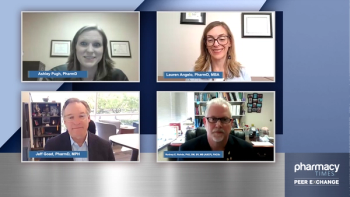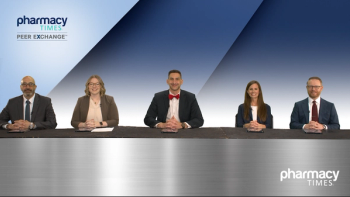
Frank Scimeca, PharmD, MBA, BCOP, discusses strategies for implementing cost-saving measures and utilizing patient assistance programs to help patients access therapy, while emphasizing the importance of mitigating financial toxicities for patients.

Frank Scimeca, PharmD, MBA, BCOP, discusses strategies for implementing cost-saving measures and utilizing patient assistance programs to help patients access therapy, while emphasizing the importance of mitigating financial toxicities for patients.

The panelists provide guidance on how pharmacists should advise patients on recognizing RSV symptoms that require urgent medical attention.

Medical experts highlight the importance of clinical decision-making and the pivotal role pharmacies play in initiating conversations and identifying high-risk patients during consultations for new medications.

Jodi Taraba, PharmD, MS, BCOP, offers insights on the benefits of involving oncology pharmacists in clinical trial research to advance treatment and care for patients with cancer.

Sarah Rockwell, PharmD, BCOP, explores how community oncology practices can understand and meet the requirements of risk evaluation and mitigation strategy programs, and stresses the importance of developing and implementing standard operating procedures.

Key opinion leaders address the importance of coordination between academic hospital providers and community oncologists when transitioning from initiation of bispecific antibodies at a tertiary hospital to maintenance therapy in the community oncology setting.

Panelists highlight the significance of obtaining leadership buy-in and involving all care team members, while also sharing strategies for coordinating care effectively across the entire team.

Key opinion leaders emphasize crucial factors for pharmacists to consider, such as medication costs, staying updated on the latest hepatic encephalopathy (HE) clinical advancements and trials, and understanding disease incidence, which can help prevent recurrence, reduce healthcare costs, and improve patients' cognitive function when managed effectively.

Expert perspectives on metrics that pharmacists can track to quantify adherence rate improvement, treatment intensification, and cholesterol level optimization over time.

The panel offers its thoughts on the current and potential role of pharmacists in the treatment of patients with ASCVD.

A medical expert compares CDK4/6 inhibitors and discusses the importance of monitoring specific parameters, such as ECGs and laboratory tests, to minimize adverse events associated with each drug.

5. Frank Scimeca, PharmD, MBA, BCOP, leads a discussion on sequencing CDK4/6 inhibitors, comparing their side effect profiles, toxicity benefits, and progression-free survival (PFS) advantages. He emphasizes the need for additional biomarkers and clearer guidance from the NCCN to aid in selecting the most appropriate drug for each patient.

The panelists address the challenges of administering multiple vaccines to eligible patients, while also discussing the timing and compatibility of administering certain vaccines simultaneously. They emphasize the importance of being receptive to patient concerns and providing guidance on childhood vaccinations for hesitant individuals.

Lauren Angelo, PharmD, MBA, acknowledges the progress made in RSV vaccinations but emphasizes the persistent need to educate at-risk patients about the advantages of vaccination, citing data indicating that many patients are willing to get vaccinated but may require encouragement, and concurs that the lack of physician referral remains a crucial barrier to improving vaccination rates among high-risk groups.

Expert discusses how patient support programs, patient assistance programs, and artificial intelligence can help address challenges patients face in access to specialty medications.

Natalie Bedford, senior vice president, US Pharmaceutical Distribution Services at McKesson, discusses the unique challenges of distributing specialty drugs.

Candy Peskey highlights the necessary role of oncology pharmacists in patient care and enrollment in clinical trials.

Access to certain drugs may be limited through tighter formulary controls and utilization management by Medicare Part D plans dealing with higher costs

Scott Soefje highlights how oncology pharmacists can advance patient-centered care and drive innovation in clinical research.

The expert panel explores the importance of communication and collaboration among care providers when patients with multiple myeloma who are receiving treatment with bispecific antibodies navigate transitions of care to and from various healthcare settings.

Medical professionals share insights on treatment considerations and patient selection for bispecific antibody therapy and the process for referring patients to other institutions for care.

Key opinion leaders highlight essential considerations for pharmacists, including medication costs, staying current with the latest advancements and clinical trials in hepatic encephalopathy (HE), and understanding the incidence of the disease.

Experts explore strategies for motivating treatment adherence and the importance of providers ensuring patients thoroughly understand their condition.

Clinical insights on how real-world treatment persistence and discontinuation rates compare between the various non-statin therapies and the factors that contribute to these differences.

The expert panel discusses the cost-effectiveness and clinical evidence gaps for non-statin therapies, including PCSK9 inhibitors, inclisiran, and bempedoic acid.

Britny Brown, PharmD, BCOP, discusses the importance of the NCCN guidelines in the treatment of metastatic breast cancer (mBC) and explains how the NCCN recommendations for CDK4/6 inhibitors differ for first-line patients.

Heather Moore, BCOP, CPP, PharmD, discusses patient adherence to CDK4/6 inhibitors in clinical practice, emphasizing the importance of educating patients on drug efficacy and potential toxicities, monitoring for adverse events, and following up with patients to ensure better adherence.

Medical professionals explore social determinants of health, including access to and quality of health care, information sources, community context, and built environment, while also examining the influence of race, ethnicity, language on these factors.

The panelists define vaccine fatigue and identify its primary causes as confusing messaging and the high number of annual vaccinations suggested, emphasizing that the most effective way to combat this fatigue is by tailoring the vaccine information and recommendations to the individual patient's specific needs.

A clinical pharmacist discusses his work in the mental health space while stressing the importance of advocating for and checking in with one another’s emotional well-being.